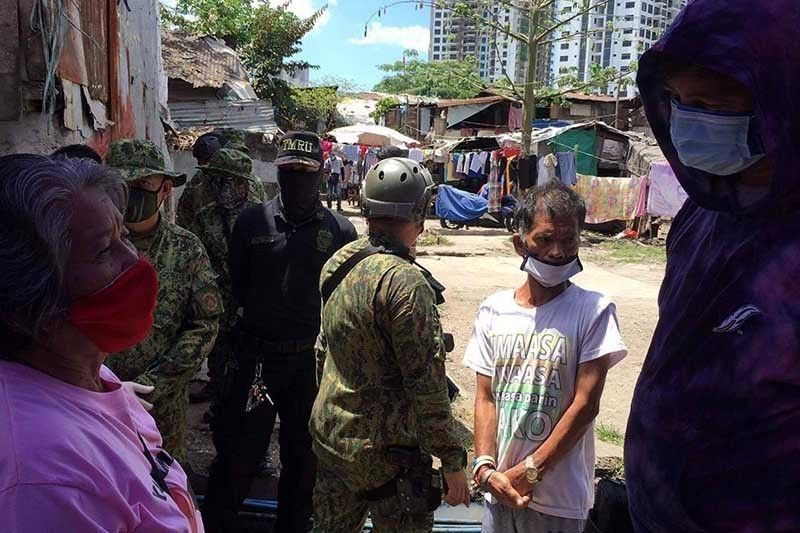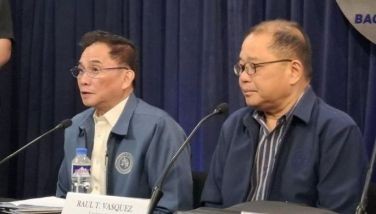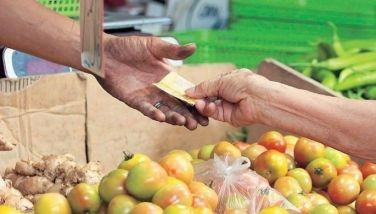QC Court on San Roque 21: No crime in being hungry and pleading for food

MANILA, Philippines — Arrested and jailed for leaving their homes to ask the government for food, the residents of Sitio San Roque in Quezon City who were nabbed during the stringent lockdown in April 2020 have finally been cleared, with a Quezon City court ruling that food is essential and to ask for it is within their right.
Quezon City Metropolitan Trial Court Branch 38 has granted their Demurrer to Evidence and acquitted the 21 San Roque residents of charges filed against them by police. The decision ended two years of anxiety over the possibility of imprisonment.
A demurrer challenges the sufficiency of the prosecution evidence and paves the way for the dismissal of the case while still in trial.
"Wherefore, premises considered, the Demurrer to Evidence is granted. Accused… are acquitted in Criminal Case Nos. 02888, 02889 and 028890," the ruling pended by Presiding Judge John Boomsri Sy Rodolfo read.
"The accused were acting within their rights when they went outside of their respective residences to plead for food," the court said in a ruling dated June 6.
The court also ordered the return of the P15,000 that each of them accused paid as bail bond.
‘Driven by hunger’
As the pandemic forced the people of Metro Manila and the rest of the world to stay in their homes in early 2020, urban poor residents of San Roque in Quezon City went out on the streets on April 1 to wait for food aid that they had been told would be distributed to the community.
Instead of food, what they got was a violent dispersal by the police and cases in court while their families remained hungry.
One of the chief charges against them is “non-cooperation” under Republic Act 11332, or the Mandatory Reporting of Notifiable Diseases, a charge used often during the long lockdown in the Philippines.
But the court pointed out that the Palace memorandum on the lockdown stated that movement to access basic necessities such as food is allowed. It stressed that even one of the police witnesses admitted to the court that the accused were on the streets with placards demanding food "due to hunger."
"Furthermore, the arresting officers were aware that the accused were only outside of their respective residences on 1 April 2020 to ask for food. As this is an allowed movement, there was no need to direct the accused to return home," the ruling read.
"While others simply lined up in groceries and supermarkets to get food during the ECQ, the accused in these consolidated cases, unfortunately, were constrained to publicly plead and beg for food," the court said.
Public assembly and disobedience
The court also junked the charge for violation of BP 880 or the Public Assembly Act of 1985, the Marcos-era law regulating protests and assemblies. The law only penalizes leaders of assemblies held without a government permit. The April 1 incident, according to community organizations in Sitio San Roque, was spontaneous and spurred by rumors of food distribution that day.
The court added that the prosecution's evidence failed to establish that the accused engaged in violent acts during the supposed rally.
On the disobedience charge, the court stressed that the accused were acting within their rights when they went out to plead for food.
"Therefore, the police officers, at the time they confronted the accused and under the circumstances established in this case, cannot compel the latter to obey their directive to go home," it added.
'Fight continues'
The San Roque 21, as the arrested residents were eventually called, were bailed out by bayanihan, with people contributing to pay their bonds. But lawyer Kristina Conti told Philstar.com in February 21 that the residents continued to be haunted by the fear of going to jail. This fear added to their daily worry of finding enough to eat when the lockdown meant daily wage earners were out of work.
While the counsels from Leflegis Legal Services and the National Union of Peoples’ Lawyers scored a triumph with the San Roque residents' acquittal, they noted that: "Political repression always thrives on fear and sheer might."
"Let this case not be remembered for the inhumanity of the Duterte administration's grossly disproportionate and incongruent response to a public health problem; let it stand testament to the enduring spirit of bayanihan in each one of us," they said.
The lawyers said that while "justice was served today. The Filipino people have to keep fighting still."
Read this two-part feature on what 'quarantine violators' faced beyond detention:
Part 1:Beyond arrest, raps: 'Quarantine violators' face trauma, COVID-19 risk too
Part 2: Driven by hunger, urban poor go out for rumored relief drive but are haled into court instead
- Latest
- Trending


































